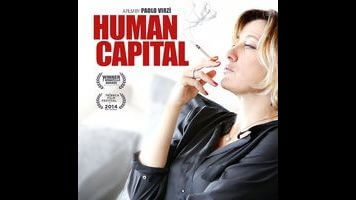Adapted from a novel by American author Stephen Amidon, with the action transplanted from Connecticut to northern Italy (near Milan), Human Capital is divided into four chapters, three of which cover roughly the same time period from different perspectives. In the first chapter, Dino (Fabrizio Bentivoglio), a moderately successful real-estate broker, uses his daughter’s relationship with a rich kid as a lever to invest in the kid’s father’s hedge fund, borrowing a ton of money and all but liquidating his business to raise the necessary cash. This does not prove to be the financial windfall he had hoped, to put it mildly. In the second chapter, the hedge-fund dude’s bored wife, Carla (Valeria Bruni Tedeschi), convinces her husband to purchase a dilapidated theater, then embarks upon an affair with the company’s prospective artistic director. Chapter three focuses on Serena (Matilde Gioli), Dino’s teenage daughter, who—though this is not at all clear from what’s seen of her in previous chapters—has just dumped Carla’s son and is falling for a charismatic juvenile delinquent (Giovanni Anzaldo). And then the final chapter neatly ties all three stories together, employing the hit-and-run accident as its fulcrum.
Part of the problem with this particular mode of storytelling, which has become quite fashionable in recent years, is that it imposes a clunky guessing game on the viewer: What’s My Theme? Apart from the fact that characters from one chapter appear fleetingly in other chapters, there’s nothing directly connecting Dino’s glad-handing desperation with Carla’s insecure anomie, and neither really has much to do with the reason why the poor catering guy gets hit by a car and left for dead (at least until the script, presumably following Amidon’s lead, huffs and puffs to create a link). Of the three character-based chapters, each of which runs about half an hour, only Serena’s is remotely compelling on its surface, thanks mostly to some clever misdirection earlier on and newcomer Gioli’s impassioned performance. Nor does director Paolo Virzì (The First Beautiful Thing) contribute much in the way of visual style, opting primarily for inexpressive shots of stunning locations. So there’s little to do except try to figure out what the movie is trying to say by juxtaposing these folks… which is wasted energy, since it comes right out and retroactively announces its intentions at the end, via a series of expository, finger-wagging closing titles (always amusing when applied to entirely fictional characters). That Human Capital all but swept Italy’s David Di Donatello awards just goes to show that other countries fall for this sort of self-importance too.


 Keep scrolling for more great stories from A.V. Club.
Keep scrolling for more great stories from A.V. Club.